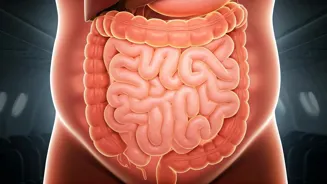Pressure and Bloating
At high altitudes, the atmospheric pressure in an airplane cabin is significantly lower than what we're used to on the ground. This pressure drop can cause
gases inside your body to expand. For instance, the air in your stomach and intestines will expand, causing you to feel bloated and uncomfortable. This expansion of gases puts pressure on your abdominal organs, which can lead to bloating, cramping, and even pain. The reduced pressure affects the way gases are processed by the body, and it can also impact the digestion process, resulting in a feeling of fullness. These conditions may not be severe, but they can drastically reduce the comfort level of any passenger during the flight, and even after landing. The effect of the pressure is further aggravated by the cramped spaces typical of commercial flights.
Swallowing Air
Another common contributor to jet belly is the act of swallowing air, a habit that often increases during flights. When you fly, changes in cabin air pressure and the often dry environment of the cabin can promote air swallowing. The pressure changes can affect the ears, and you may naturally swallow more often in an effort to equalize the pressure. Likewise, the dry air in the cabin can lead to dehydration, causing you to feel thirsty and leading to more frequent swallowing. Furthermore, chewing gum, eating, and drinking through straws can increase the amount of air you ingest. This additional swallowed air accumulates in your digestive system, contributing further to bloating and discomfort. Therefore, recognizing and avoiding habits that promote air swallowing is a crucial step toward a more comfortable flight experience.
Dietary Considerations
What you eat and drink before and during a flight can heavily impact your likelihood of experiencing jet belly. Foods high in sodium, such as processed snacks and fast food, can cause fluid retention, which exacerbates bloating. Carbonated drinks, like soda, introduce extra gas into your digestive system, amplifying discomfort. The same applies to foods that are naturally gas-producing, like beans and broccoli. Alcohol can also cause bloating by interfering with digestion and causing dehydration. Therefore, making wise dietary choices before a flight can significantly decrease the chances of bloating. It's advisable to drink plenty of water to stay hydrated and to eat easily digestible foods like fruits, vegetables, and lean proteins to minimize bloating and ensure a smoother journey.
Movement and Hydration
Remaining mobile and staying properly hydrated are key strategies for countering jet belly. Prolonged sitting can slow down digestion and contribute to bloating. Periodically walking around the cabin or performing simple exercises in your seat can stimulate circulation and ease digestion. Staying hydrated is critical, as dehydration can make bloating worse. Drink plenty of water throughout the flight, and avoid excessive amounts of caffeinated or alcoholic beverages, which can have a diuretic effect, leading to dehydration. Maintaining blood circulation and good hydration levels are essential for minimizing bloating and discomfort during air travel. Consider taking brief walks during the flight, and drink water regularly to counteract the effects of reduced pressure.
Medical Solutions
For those who are prone to jet belly, certain over-the-counter medications and remedies can provide relief. Antacids can help reduce stomach acid, which can ease discomfort. Anti-gas medications, such as simethicone, help break down gas bubbles, reducing bloating and flatulence. Probiotics, taken a few days prior to the flight, can promote healthy digestion and reduce bloating. Consulting a doctor is always advised before taking any new medication. Wearing compression socks can help improve circulation and reduce fluid retention in the legs, which indirectly can provide comfort. Exploring different options available to you can provide more comfort and a more relaxed travel experience.
Post-Flight Recovery
Even after a flight, you can take measures to alleviate any lingering effects of jet belly. Gentle exercise, such as a leisurely walk, can help to stimulate digestion and reduce bloating. Drinking herbal teas, like peppermint or ginger, can help to soothe the digestive system and reduce discomfort. Avoid eating heavy meals immediately after the flight. Instead, opt for lighter, easily digestible foods. Allowing your body to rest and recover after a flight is a crucial part of the process. Doing so can help your digestive system return to normal. Listen to your body and take the appropriate steps to ease any discomfort that may linger from the flight.















